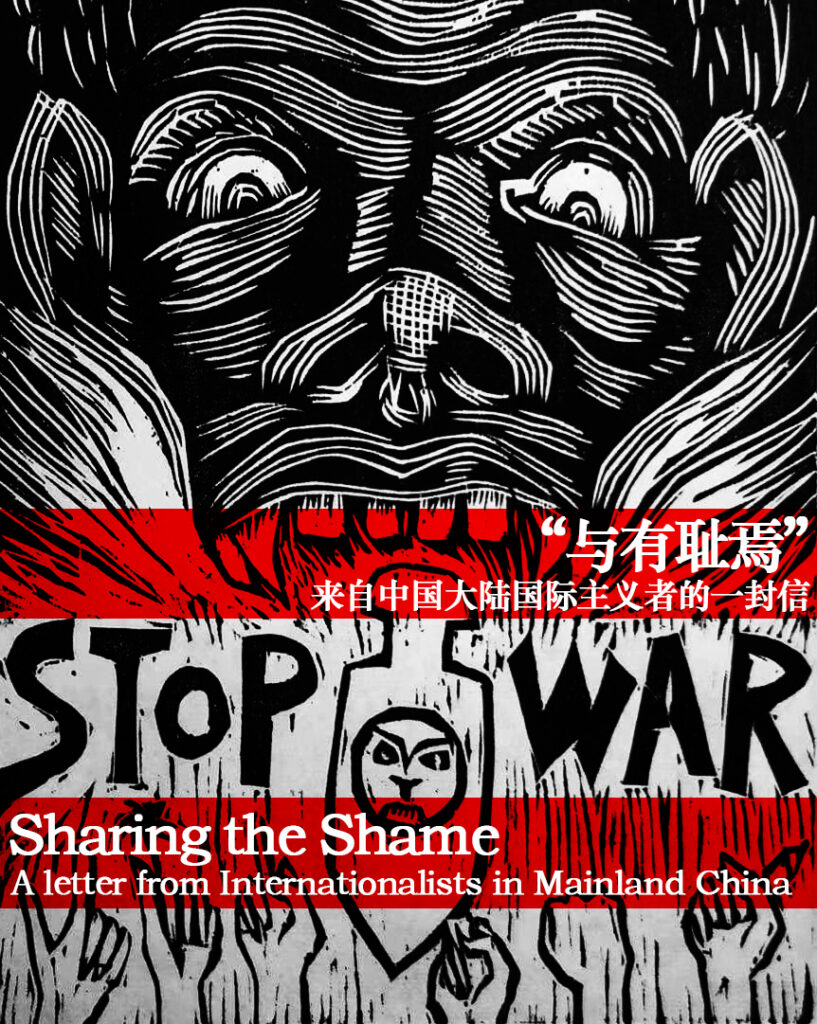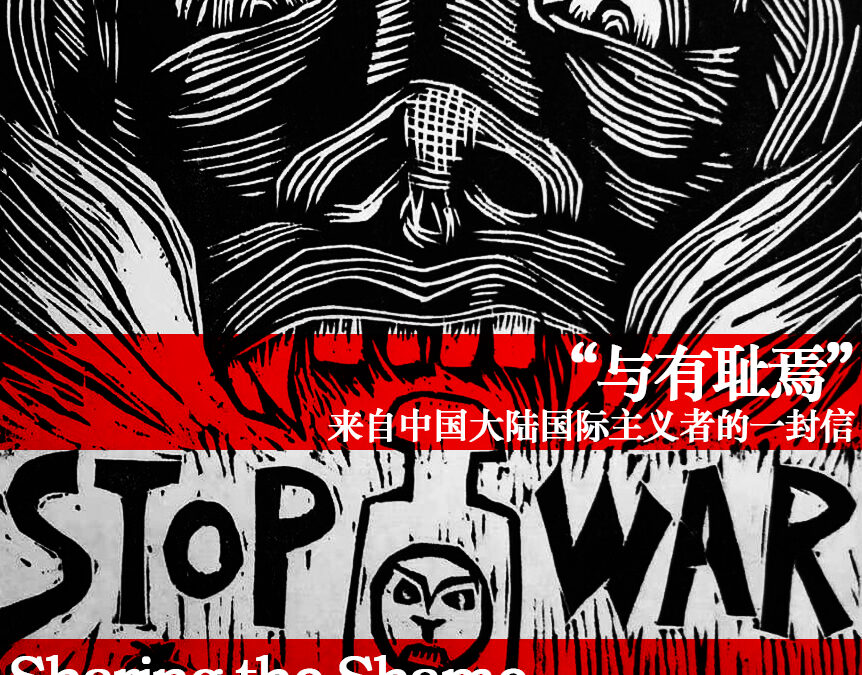As noted in our previous post, the Chinese state and social media platforms have been censoring some of the content critical of the Russian invasion of Ukraine (although this has been inconsistent, as the state itself has yet to take a clear stance on the matter). Meanwhile we received the following letter from an anonymous group that identifies as mainland Chinese internationalists. It provides a good window into how the recent conflict has been perceived within the Chinese left. As with other reports and translations that we’ve published, the position laid out here belongs to the authors. Though we are sympathetic to the sentiment, it should be clear from the language and framing used in the piece that this is not a statement from Chuang and should not be portrayed as such. One of our goals has been to help increase the visibility of other groups and individuals in China that have been grappling with similar concerns, so we are glad to be able to host the following letter. (Scroll down for the original Chinese.)1
1.
As internationalists, we are firmly against the invasion by Russia, to the same degree that we are against NATO’s reckless expansion. What we’re in support of is not the Ukrainian government, but the right of the Ukrainian people to be free from any imperialist interference.
Putin has backed the indepence of the two republics in Donbas, claiming to protect the people there from the Ukrainian government. Undeniably, over the past eight years, the residents of Donbas have been living in endless wars. What the people there are yearning for is peace, rather than what Putin has been doing, i.e., infinitely expanding the war. We will not deny the persecution of the local people by the Ukrainian government, nor will we deny the presence of neo-Nazis in Ukraine (just like in Russia), nor will we deny the existence of progressive, anti-fascist efforts in the armed struggle of the people of the Donbas region. But if Putin’s regime really means to protect the people of Donbas, as he has been claiming, we will have to make it clear: how many of those who are representative of the people of Donbas have died at the hands of the Great Russia chauvinists and Putin’s back-stabbing army?
The “de-Nazification” of Ukraine sounds more like a joke, considering that Putin and his followers have been the strongest supporters of the European far-right for the past decade. Russia’s invasion of Ukraine will only boost and reinforce radical nationalism within the country. Putin wants to popularize the idea that Ukraine is a country constructed by Lenin and the Soviet Union. However, as other progressive groups have pointed out, which existing nation-state is not the product of construction? In the name of “decommunization”, what Putin really desires is to erase Ukraine’s sovereignty and even its national identity while concealing his ambition to rebuild a monoethnic Russian empire. It is true that Ukraine would not have formed its current borders without the Leninist principle of national self-determination – including the equality of nationalities and the freedom to political secession. But what Putin does not dare to admit is that without such a principle, the Soviet Union would not have gained the trust of its constituent republics from the beginning, and the 70-year union of Socialist republics could not have existed at all.
Rhetoric is hypocritical and fragile in the face of real geopolitical forces. For the past decades, concerns for “human rights” and “genocide” are frequently used to justify wars started by the West. Didn’t Russia, seemingly on the opposite side, use precisely the same rhetoric in the case of Donbas? Likewise, for the United States, which was quick to impose sanctions based on human rights considerations, where are the sanctions against Israel, at a time when it is occupying Palestine and imposing apartheid? Where are the sanctions against Saudi Arabia, which is still invading Yemen and causing a huge humanitarian disaster? Not to mention that many analyses have long pointed out that economic sanctions, while they may indeed weaken the Russian regime’s ability to fund its war machine, will impose a greater impact on ordinary people than on Russia’s powerful elite. What is clear is that the dictator never cares whether his people suffer.
2.
This is not a war between the Russians and the Ukrainians. It is a war between Putin and Biden and the superpowers behind them. It is a war that will have no victor but which will create countless victims.
It is a war between the people with simple justice and a state that worships power. In Russia, we see countless anti-war voices from common people. They are not fearless. Everyone is deeply aware that they are risking arrest for holding “No War” banners high, that any expression of dissenting opinions might land them in prison, that the regime is taking advantage of the emergency to further its suppression of dissidents, and that more than 1,700 people were taken away by police for protesting the first day when Putin launched the invasion. That said, shame and fury has driven countless Russian people out onto the streets again and again. The protest against Putin’s regime is not limited to this specific war, if we realize that Russian people had already been engaged in an invisible war against their government for many years concerning Moscow’s widespread corruption, the collusion with energy oligarchs, the manipulation of democracy, and the use of gangsters to attack the opposition. How absurd is it for a regime to claim that it can rescue another nation while at the same time repressing its own people?
This is not just a war on the ground, but also an information war online. People end up being represented by their states, and the same information or concept might have completely opposite meanings for different camps, or be held hostage by different preconceptions. Then, in frenzy and anxiety, these warped ideas float out across borders on the winds of war. Living in China, we have found ourselves in an absurd situation of what the state media ironically call “cognitive warfare”. The Chinese government has been condemned by the international community for its ambiguous attitude: advocating for peace on the one hand, while strengthening its ties with Russia on the other. Meanwhile, under the propaganda of the mainstream media and increasingly stronger censorship over many years, Chinese netizens are unfortunately seen at this time by the world as the biggest and loudest supporters of war and of Putin. Progressive anti-war voices are muted, and protesters are punished. Ashamed as we are, we strongly condemn the propaganda machine that, once again, “points to a deer and calls it a horse.” At the time when the Russian invasion had just begun, our government was busy persecuting its own population in one of the biggest public opinion crises China has seen in recent years. The entire nation was shocked by revelations of countless cases of trafficked women, who had been tortured and treated as sex slaves for decades. These crimes had evolved into a social norm with the collusion of local governments.
We will be living in the post-truth era for a long time to come, in which emotional divisions will take the role of “common sense” in public life. Therefore, we defend the right of the Ukrainian people to determine their own destiny, and the right of the Russian people and others living under authoritarian regimes to express disagreements with their governments, as well as to demonstrate solidarity with those who have been invaded. “Shame” has been a common sentiment expressed from Russia in the recent anti-war rallies on the streets and on the Internet. And we, the Chinese internationalists, share the shame.
3.
The Ukrainian people have their own wills, and they have the right to decide their own destiny without interference from Western or Eastern imperialism. They should be freed from any harm done in the name of “protection” or “rescue”. But at the same time, we must understand the complexity and cruelty of international politics, especially when the Ukrainian people are caught between two empires, facing the war against humanity, invasion, and even the threat of nuclear weapons.
Neutrality is hypocritical under the pressing conditions of the day. Russia’s war of aggression has become unstoppable, so opposing Ukraine’s war of self-defense would contradict the anti-war activists’ claim to stand with the victims. We must stand with the Ukrainian people who are defending their country, with the Russian and Belarusian people who are risking their lives to protest against their respective states, and with people around the world who are thirsting for peace and condemning war. The international community must respect and respond to the demands of the Ukrainian people and offer practical help, and that should include us. We believe that NATO troops will not change the situation, and will only increase the chance of a world war – which is the last thing we want to see. We share the view with our predecessors, responsible anti-imperialists, who, in the anti-war movements during the Vietnam War, did not call for the Soviet Union’s interference to counter the U.S. force, but supported its assistance of arms delivery to the Vietnamese resistance. Today, there are also cyber weapons. Hacker groups disrupting Russian government websites and mainstream media, online mapping sites interfering with the march of Russian ground troops, and public opinion arenas of solidarity with the invaded. These efforts are together shaping the cyber terrain of progressivism in this war. Internationalists have a basic duty to support those who are swept up into just wars of resistance to fight against the invaders.
You cannot destroy magic with magic. What we are calling for is not fleeting anti-war passion or a kind of cease-fire that conceals more profound and invisible conflicts, but the abandonment of cold war logics and rhetorical performances. Practical efforts should be made to rebuild peace in Ukraine and beyond, to reject all strongman politics and state hegemony, and to uproot any illusions about war.
A group of internationalists from mainland China, March 1st, 2022
“与有耻焉”
来自中国大陆国际主义者的一封信
1.
作为国际主义者,我们旗帜鲜明地反对俄罗斯的侵略,也反对北约的无节制扩张。我们支持的并非乌克兰政府,而是乌克兰人民不受任何帝国主义干涉的权利。
普京扶持顿巴斯的两个共和国“独立”,宣称要保护那里的人民不受乌克兰政府侵害。八年以来,顿巴斯人的确一直活在无尽的战争之中,那里的人民想要的是和平,而非普京此刻在做的无限度扩大战争。我们不会否认乌政府对当地人民的迫害,也不会否认乌克兰境内——正如在俄罗斯境内一样——存在着新纳粹分子,更不会否认顿巴斯地区人民的武装斗争中存在进步的、反法西斯主义的成分。但如果普京政权真如自己所宣称、旨在保护顿巴斯地区的人民,我们就不得不与他算一笔账:那些真正代表顿巴斯人民的力量,究竟有多少死于大俄罗斯沙文主义者与普京政权的背刺?
为乌克兰“去纳粹化”更像是一个笑话,过去十年来,普京和他的同僚们一直是欧洲极右翼最有力的后盾。而俄罗斯对乌克兰的入侵只会加强和巩固乌克兰内部的激进民族主义势力。普京想要普及一个观念,即乌克兰是一个被列宁和苏联建构出来的国家,可是,正如其它进步团体指出的,哪一个现有的“民族国家”又不是被建构出的呢?借助“去共产化”的口号,普京不过是要抹杀乌克兰主权国家地位乃至民族身份,掩盖自己重建全俄罗斯帝国的野心。没有列宁所坚持的民族自决原则——包括各民族平等以及分离的自由,乌克兰也许确实不会形成现有的国界。但普京不敢承认的是,没有这样的原则,苏联甚至从一开始就不会得到各加盟共和国的信任,那个历史上延续70年之久的社会主义共和国联盟压根就无法存在。
在地缘政治的驱动力面前,任何修辞都显得虚伪而孱弱。在过去几十年间,“种族灭绝”等人权话语经常成为西方国家发起战争的合法性措辞,而看似站在这些概念对立面的俄罗斯,这一次不是恰恰在顿巴斯问题使用了同样的话语吗?相反,美国此次支持乌克兰“主权完整不可侵犯”,不恰恰是以往对立阵营反对其战争的话语吗?我们同样要质问,对动辄以人权考量施加制裁的美国来说,对占领巴勒斯坦实施种族隔离的以色列的制裁在哪里?对于入侵也门造成巨大人道主义灾难的沙特的制裁在哪里?遑论许多分析早已指出,经济制裁尽管在一些地方确实可能削弱了普京政权为其战争机器提供资金的能力,然而它对俄罗斯权贵冲击有限,却将使普通民众的生活雪上加霜。显而易见的是,独裁者从不在乎他的人民是否受苦。
2.
我们必须明了,这不是俄罗斯人和乌克兰人之间的战争,而是普京和拜登及各自所代言的超级权力之间的战争,这是没有胜利者但有无尽受害者的战争。
这是葆有朴素正义的人民与崇拜强权的国家机器之间的战争。在俄罗斯,无数人正在反战,人们并非不害怕——每个人都深知表达不同意见会导致被囚于狱中的命运,政权正在借助紧急状态加剧对异见者的打压。然而,羞耻与愤怒使数不清的人一再走上街头,即便反战抗议第一天就有超过1700人被抓捕。俄罗斯人民对普京政权的抗议并不局限于这场战争,官员普遍性的腐败、与能源寡头的勾连、操纵民主以及动用黑帮清理反对派。一个政权在对内实行专制和压榨的同时,却大言不惭地对外宣称要去解救其他民族,这是多么地荒谬和可笑。
它不只是地面上的战争,也是一场赛博世界的信息战。人民被国家代表,信息在不同阵营被重塑、或至少被既有认知所裹挟,狂热与焦灼都随战争延伸出国界线。身在中国,我们处于被喉舌媒体讽刺地称为“认知战”的荒诞情境,中国政府在这场战争中态度暧昧因而被国际社会谴责,在主流媒体多年来的宣传和密不透风的审查制度下,进步的反战声援被销声,中国网友也很遗憾地以显眼的战争和普京的支持者形象被世界看见。我们对此感到抱歉并谴责罔顾道德良知、颠倒认知黑白的官方宣传机器。政府再一次“指鹿为马”,正如在俄罗斯侵略乌克兰的战争爆发前中国社会中最大的舆论事件——无法统计数目的被拐卖妇女几十年间在政府的默许下沦为性奴和生育机器——中他们的反应一样。
在未来很长一段时间,我们都将面临一种二元对立、情感割裂、“常识”不再生效的后真相状况。我们捍卫乌克兰民众决定自己命运的权利,也捍卫俄罗斯民众(以及其它生活在威权主义地区民众)表达对自己政府异见、与受侵略者建立团结的权利。“耻辱”是俄罗斯抗争民众近日在街头反战集会中最重要的口号,而我们,中国的国际主义者,“与有耻焉”。
3.
乌克兰人民有自己的意志,他们拥有不受来自西方或东方帝国主义的干涉、自行决定自己国家命运的权利,不需要任何以“保护”或“拯救”为名的伤害与掠夺。但同时,我们必须理解国际政治的复杂性与残酷性,尤其当乌克兰人民正夹在两大帝国之间,面临着反人类的战争、入侵甚至核弹威胁。
面对当下的紧迫情况,标榜中立是伪善的。俄罗斯的侵略战争已经势不可挡,那么反对乌克兰的自卫战争不仅可耻,也与反战者宣称的与受害者站在一起的立场自相矛盾。我们必须与捍卫家国的乌克兰人民同在,与冒着风险抗议强权的俄罗斯与白罗斯人民同在,与世界各地渴求和平反对战争的人民同在。国际社会必须尊重与回应乌克兰人民提出的要求并给予实际的帮助,这其中也应当包含我们。北约的出兵不会改变局面,只会增加世界大战的可能性——这绝不是我们想要看到的。早年经历过越战反战动员的前辈以他们的经验告诉我们,负责任的反帝国主义者并没有呼吁苏联参战以对抗美国入侵越南,但他们都支持苏联向越南抵抗力量增加武器输送。而在今天,我们的武器还有赛博技术——无论是黑客团体对俄罗斯政府网站和主流媒体的破坏、线上地图网站对俄罗斯地面部队行进的干扰,还是舆论场上与受侵略者的团结,都在形塑这场战争中进步主义的赛博地貌。支援 被迫卷入正义战争的人 与侵略者作战 是一项基本的国际主义义务。
魔法无法消灭魔法,我们呼唤的不是昙花一现的反战激情与掩耳盗铃的和平,而是放弃冷战思维和修辞表演,切实为重建乌克兰及更大范围的和平做出努力,是拒绝一切强人政治与国家霸权、从根本上破除任何战争幻想。
中国大陆的一群国际主义者,2022年3月1日

Notes


可惜在国际关系中 学者和政客永远是两路人 披上政客的身份,就不再有真相和理智 世界都需要“睁开眼睛看!” 国际社会长期面临着“借口失明”的困境
Those in academics and politics are totally opposite groups. Politicians are far away from truth and rationalism.
是国际主义,还是国防文学?空泛之论还望斟酌。
魔法无法消灭魔法,我们呼唤的不是昙花一现的反战激情与掩耳盗铃的和平,而是放弃冷战思维和修辞表演,切实为重建乌克兰及更大范围的和平做出努力,是拒绝一切强人政治与国家霸权、从根本上破除任何战争幻想。
———-
这不叫国际主义 叫世界主义。不禁要问:战争的根源–帝国主义是什么?
Korean translation: 부끄러움을 공유하며 – 중국 국제주의자들의 편지
https://en-movement.net/321
Russian translation:
Разделяя стыд. Письмо китайских интернационалистов.
https://telegra.ph/Razdelyaya-styd-Pismo-kitajskih-internacionalistov-03-04